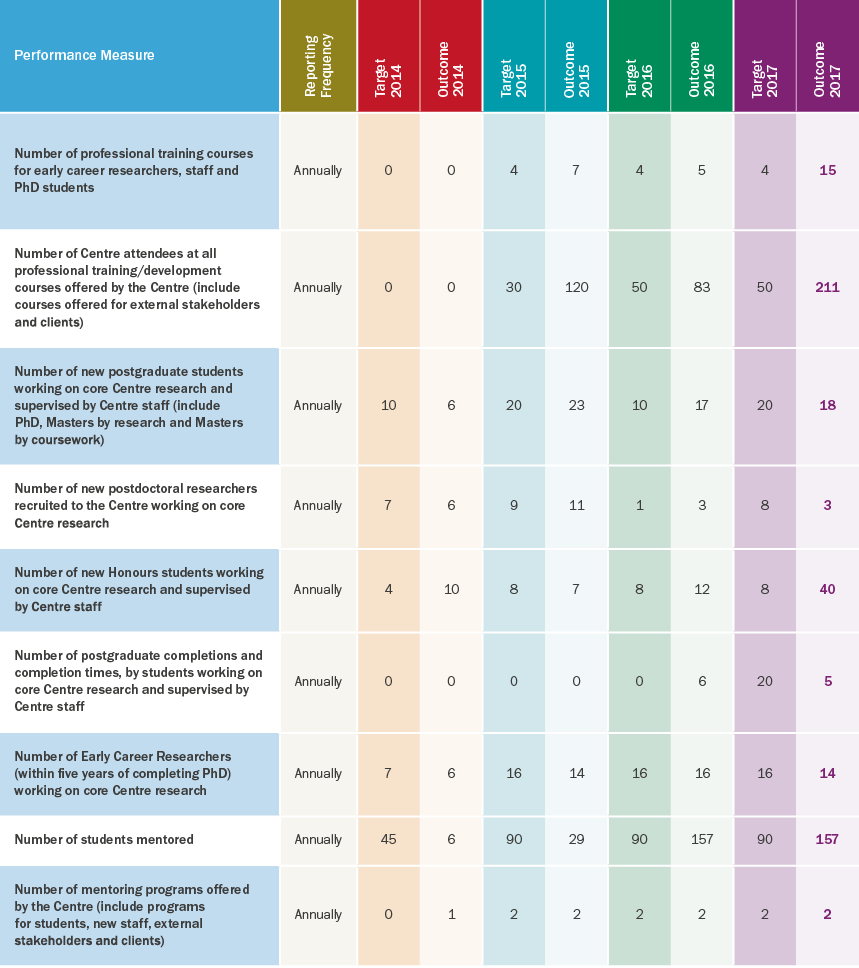Research Training and Professional Development
Research Training
We strive to provide a rich training experience for early career researchers and over the Centre’s seven-year life we will train 24 postdoctoral fellows and 80 PhD students. Eighteen new PhD researchers were welcomed to the Centre this year, along with three new postdoctoral researchers.
The Centre offers a range of professional development opportunities for its researchers and staff, such as:
- Travel to other Centre nodes or our overseas partner universities, to experience different research environments
- The opportunity to attend top international conferences and regular seminars at Centre nodes
- Meeting and interacting with eminent visiting researchers from our national and international partners
- Research training for early career researchers, delivered in both face-to-face and online formats and supplemented by a specialist toolbox that we host on the Centre’s intranet.
RoboVis 2017
Our annual symposium, RoboVis, gives researchers from Centre nodes around the country the opportunity to come together as a group and share their research in a relaxed environment. This year, 90 researchers and guests, gathered at the beautiful Tangalooma Resort on Queensland’s Moreton Island to focus on areas of knowledge leadership and career development, share their research and connect with their interstate colleagues. We were joined by the Chair of our Centre Advisory Committee, Dr Alex Zelinsky, and members of our End-User Advisory Board, Russel Rankin, Alan Davie, Trent Lund, Peter Katsos, Rob Wood and Andrew Harris.
RoboVis 2017 included guest speakers, a technical program, three-minute thesis spotlights, technical demonstration sessions and a research poster session. Highlights of the event included a “Women in STEM” breakfast forum with QUT’s Mathilde Desselle and an industry presentation from PwC’s Trent Lund, who is also a member of the Centre’s End-User Advisory Board. We enjoyed some socialising with a trivia night, a bonfire night, wild dolphin feeding, along with the eagerly anticipated presentation of the 2017 Centre Awards.
We closed the symposium with a knowledge leadership workshop for our research fellows and PhD researchers. This was the last in a 2017 series of customised knowledge leadership training modules to help support our early career researchers’ professional development.
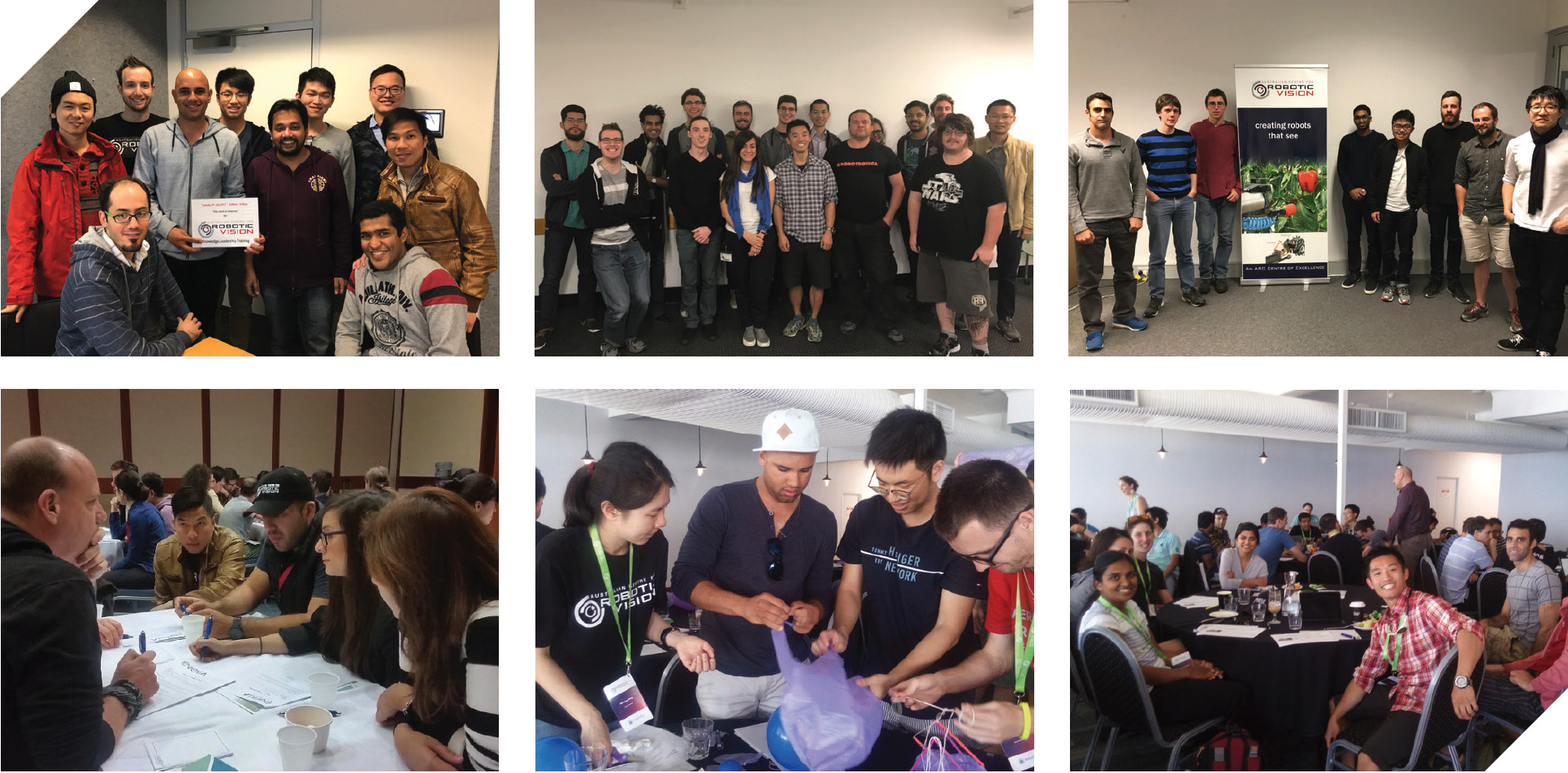
5 The Centre ran 8 knowledge leadership workshops in 2017, ending with a full-day workshop with all Centre PhD researchers and research fellows at RoboVis
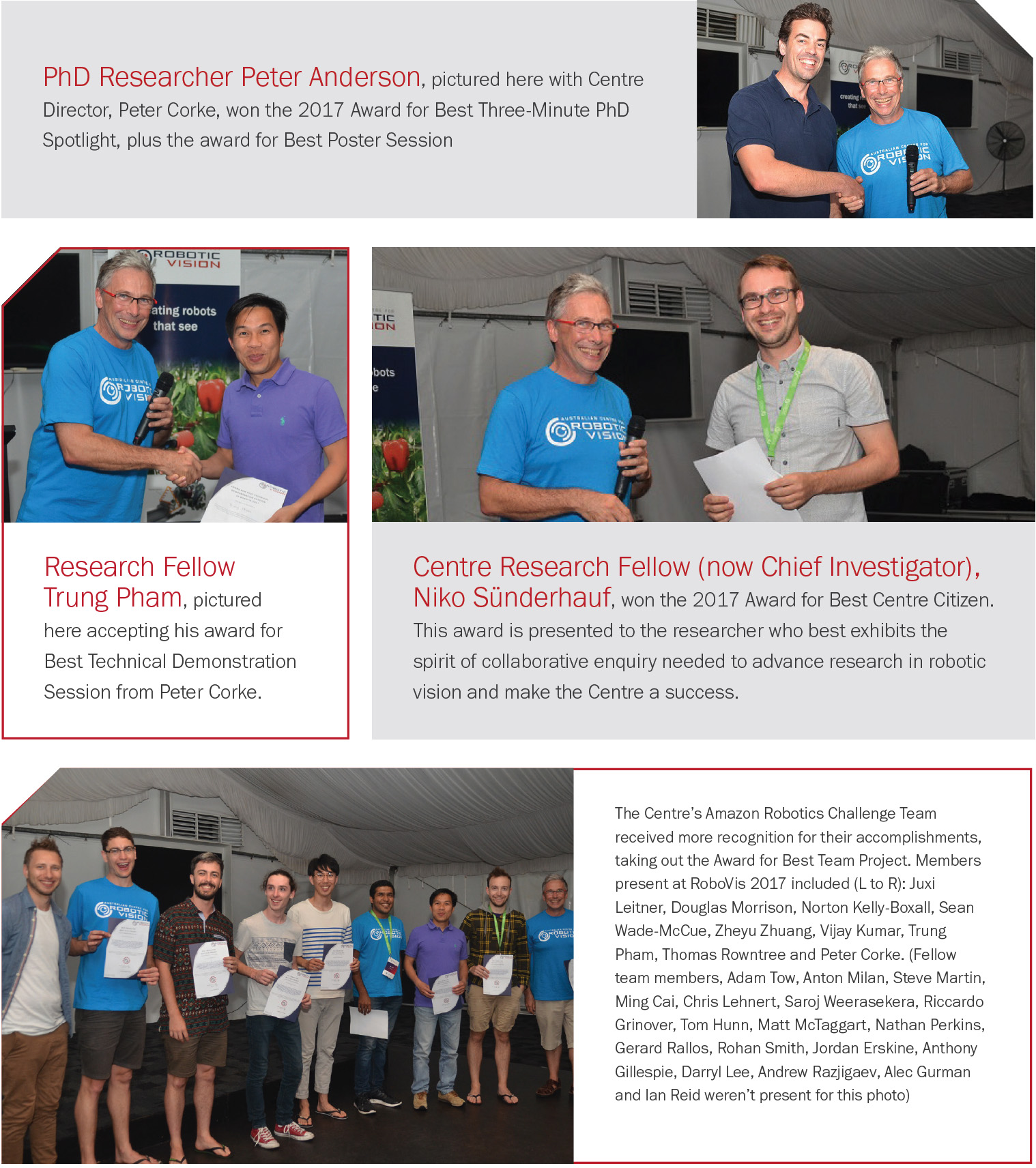
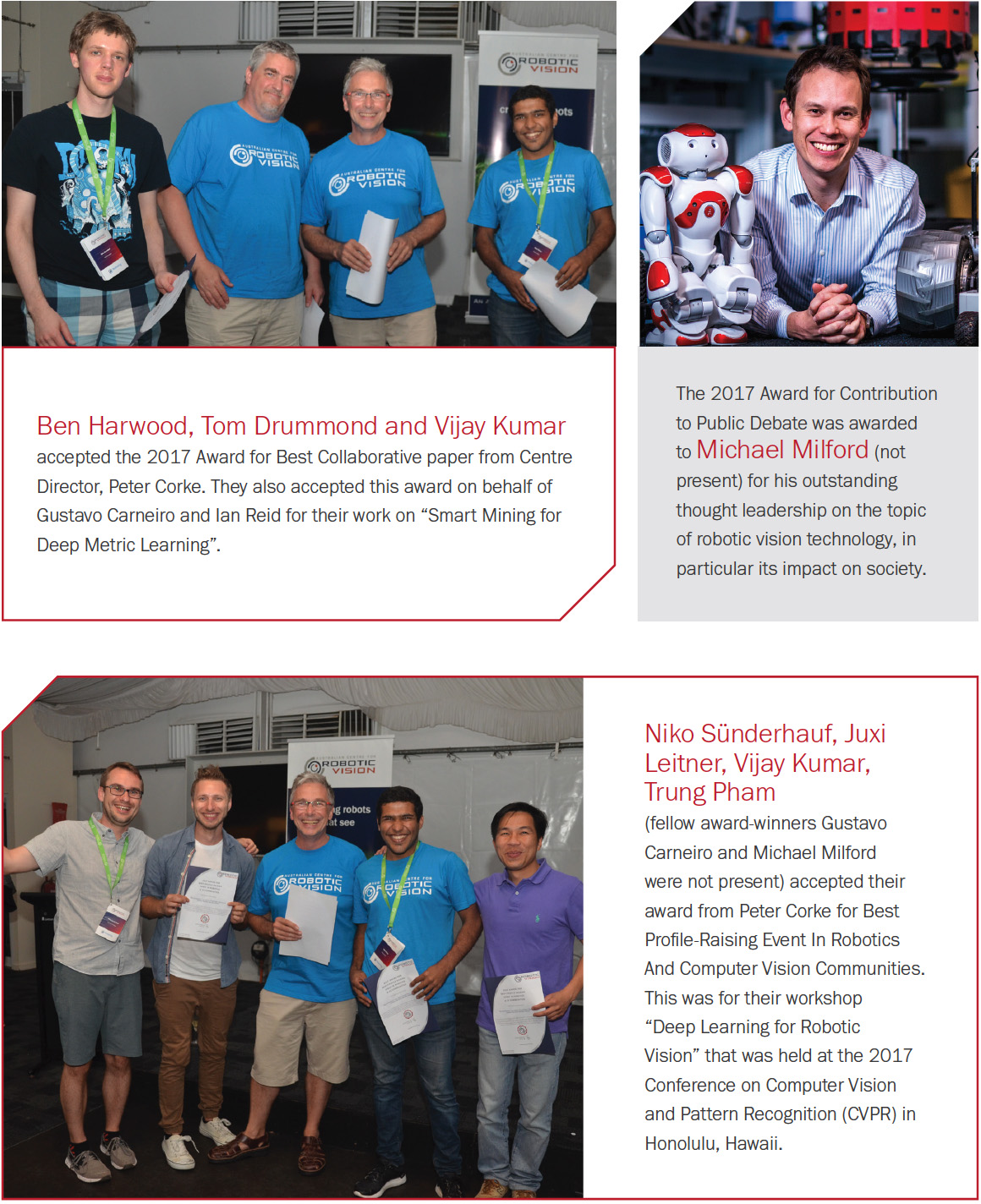
Leadership development
The Centre strongly focuses on developing our early career researchers. We are developing our PhD researchers and research fellows into knowledge leaders who will transfer their robotic vision knowledge into either industry or academia. We envisage a time when we will see our graduates and alumni founding new companies in Australia’s fledgling robotic vision industry and we want to ensure we give them the skills and support they need to take robotic vision to the world.
We have developed a custom program of knowledge leadership workshops with organisational development specialists, Evexia, designed to give early career researchers the skills they need to lead others in any sphere of influence. We held two workshops at each Centre node and another whole-of-Centre workshop as part of our RoboVis 2017 activities. We also delivered custom in-house training at each node on the subjects of Careers and Start-ups.
The result of our focus on developing research leadership, as well as leading researchers, is clearly demonstrated by the level of recognition our Centre staff gain for their talent, both at home and abroad. The Australian Centre for Robotic Vision continues to be an attractive prospect to other researchers to join us bringing our total cohort to 75 early career researchers including 18 research fellows and 57 PhD researchers. Our international quota remains high with all our research fellows and 65% of our PhD researchers hailing from more than 15 countries.
Gender diversity
We have to acknowledge that all our Centre investigators are male, reflecting significant gender imbalance. These imbalances are acute in computer science and only slightly better in engineering. We are actively pursuing ways to redress this, by employing a number of tactics, such as addressing unconscious bias in advertising when recruiting for research fellows and PhD researchers.
We also engaged external consultants, Gender Matters, to help us investigate other ways to build gender diversity in our field. In October 2017, at our annual RoboVis symposium, the Centre launched our Robotic Vision Gender Equity Plan. This plan incorporated feedback from across the centre, in addition to the recommendations from the Gender Matters’ report. A copy of our Robotic Vision Gender Equity Plan can be downloaded from the Centre’s website. The Chair of our Centre Advisory Committee, Alex Zelinsky is a recognised Male Champion of Change.
In addition to these initiatives, Centre COO Sue Keay has been named one of Australia’s inaugural 30 Superstars of STEM, encouraging female role models in robotics and computer vision. Sue has also been working with the AnitaB.org Institute to bring the internationally recognised Grace Hopper conference to Australia in 2019 to celebrate the achievements of women technologists. These female-focussed conferences in Australia have been credited with improvements in gender equity in fields such as Physics (Women in Astronomy) and Mathematics (Women in Mathematics).
We also have a number of high profile female researchers associated with the Centre including former Centre Advisory Committee, member Professor Michelle Simmons, who was named Australian of the Year in January 2018. Centre Research Affiliate Dr Anjali Jaiprakash who has been named one of 25 Women in Robotics to know about and was recently named one of MIT Tech Review’s Top innovative researchers under 30 in the Asia-Pacific region. And new Centre advisory committee member Kylie Ahern, who founded Australia’s Science magazine, COSMOS.
Our number of female PhD researchers is improving each year, currently we have 54 PhD researchers, five of whom are female with three new female PhD researchers joining the Centre in early 2018.
Diversity of Staff
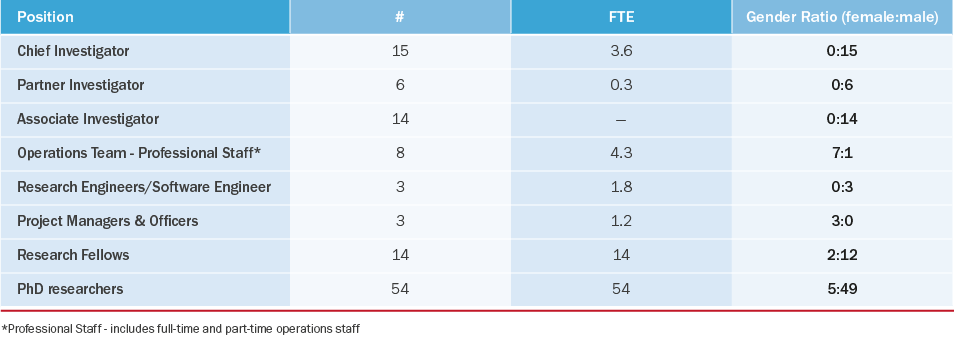
Mentoring
Our goal for all Centre researchers is for them to have a mentor they can learn from, while building a solid and trusting relationship. A mentoring relationship gives researchers an informed second opinion, and helps them gain insights and awareness of their own performance through the eyes of a ‘critical friend’. Through this relationship, researchers can identify their personal development needs, as well as learning from the experience and advice of their mentor.
Researchers select their own mentors, with support from the Centre’s Administrative Coordinator. We have a number of mechanisms to support our mentoring program, ensuring mentoring relationships are working effectively for all concerned. We intentionally allow a level of flexibility in the mentoring relationship, with a view of it being a support role, rather than a replacement of existing supervisors.
The role of a mentor may include:
sharing their expertise and experience to help individual researchers develop their talents
listening, clarifying, giving feedback and challenging researchers to consider issues from different points of view
opening doors, assisting researchers to network and further develop their careers
providing an avenue for researchers to raise issues they may have and discussing them in a safe space.
The role of a researcher working with a mentor may include:
taking responsibility for identifying and achieving development towards career goals
initiating meetings with their mentor, managing meeting dates and times and setting the agenda
being open to and appreciative of different perspectives, as well as constructive and honest feedback
being considerate of the demands placed on their mentor’s time.
Education
During May, the Centre’s QUT Node launched the Robot Academy. Providing university-level, short video lessons, as well as full online courses, the academy assists undergraduates from around the world to understand and prepare for, robotic and robotic vision technologies. Based on the Centre’s earlier “Massive Open Online Course” (MOOC) efforts, these resources are available for use, free of charge, at any time. QUT also hosts the RoboHub podcast as part of the Robot Academy.
Since its launch, our Robot Academy has had more than 125,000 views from 30,000+ unique users, in over 100 countries. More than half of these visitors return regularly. A number of universities are adopting lessons from QUT’s Robot Academy for use in their own teaching.
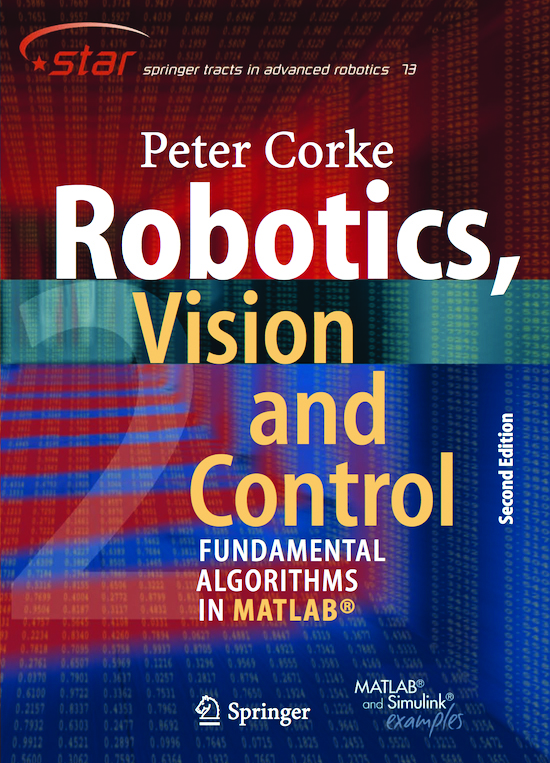
2017 was also the year that Centre Director Peter Corke released the Second Edition of his book Robotics, Vision and Control: Fundamental Algorithms in MATLAB, published by Springer.
“Robotic vision is the combination of robotics and computer vision and involves the application of computer algorithms to data acquired from sensors. This second edition is completely revised, updated and extended with coverage of Lie groups, matrix exponentials and twists, inertial navigation, differential drive robots, lattice planners, pose-graph SLAM and map-making, restructured material on arm-robot kinematics and dynamics, series-elastic actuators and operational-space control, Lab colour spaces, light field cameras, structured light, bundle adjustment and visual odometry and photometric visual serving.”
Research Training and Professional Development KPI's
